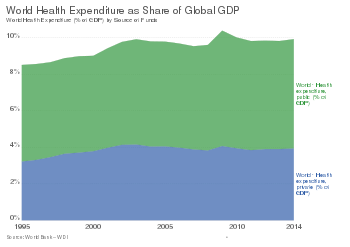
Back اقتصاديات الصحة Arabic Səhiyyə iqtisadiyyatı Azerbaijani Economia sanitària Catalan Sundhedsøkonomi Danish Gesundheitsökonomie German Sanekonomiko Esperanto Economía de la salud Spanish اقتصاد سلامت Persian Terveystaloustiede Finnish Économie de la santé French
This article may need to be rewritten to comply with Wikipedia's quality standards. (May 2009) |


| Part of a series on |
| Public health |
|---|
 |
| Part of a series on |
| Economics |
|---|
Health economics is a branch of economics concerned with issues related to efficiency, effectiveness, value and behavior in the production and consumption of health and healthcare. Health economics is important in determining how to improve health outcomes and lifestyle patterns through interactions between individuals, healthcare providers and clinical settings.[2] In broad terms, health economists study the functioning of healthcare systems and health-affecting behaviors such as smoking, diabetes, and obesity.
One of the biggest difficulties regarding healthcare economics is that it does not follow normal rules for economics. Price and Quality are often hidden by the third-party payer system of insurance companies and employers. Additionally, QALY (Quality Adjusted Life Years), one of the most commonly used measurements for treatments, is very difficult to measure and relies upon assumptions that are often unreasonable.[3]
A seminal 1963 article by Kenneth Arrow is often credited with giving rise to health economics as a discipline. His theory drew conceptual distinctions between health and other goods.[4] Factors that distinguish health economics from other areas include extensive government intervention, intractable uncertainty in several dimensions, asymmetric information, barriers to entry, externality and the presence of a third-party agent.[5] In healthcare, the third-party agent is the patient's health insurer, who is financially responsible for the healthcare goods and services consumed by the insured patient.
Health economists evaluate multiple types of financial information: costs, charges and expenditures.
Uncertainty is intrinsic to health, both in patient outcomes and financial concerns. The knowledge gap that exists between a physician and a patient creates a situation of distinct advantage for the physician, which is called asymmetric information.
Externalities arise frequently when considering health and health care, notably in the context of the health impacts as with infectious disease or opioid abuse. For example, making an effort to avoid catching the common cold affects people other than the decision maker[6][7][8]: vii–xi [9] or finding sustainable, humane and effective solutions to the opioid epidemic.
- ^ "World Health Expenditure as Share of Global GDP". Our World in Data. Retrieved 5 March 2020.
- ^ Howard, Brandon; Health, JH Bloomberg School of Public. "What Is Health Economics?". Johns Hopkins Bloomberg School of Public Health. Retrieved 25 February 2020.
- ^ Johnson, F. Reed; Scott, Frank I.; Reed, Shelby D.; Lewis, James D.; Bewtra, Meenakshi (June 2019). "Comparing the Noncomparable: The Need for Equivalence Measures That Make Sense in Health-Economic Evaluations". Value in Health. 22 (6): 684–692. doi:10.1016/j.jval.2019.03.011. PMID 31198186.
- ^ Arrow, Kenneth (1963). "Uncertainty and the Welfare Economics of Medical Care". The American Economic Review. 53 (5): 941–973. JSTOR 1812044.
- ^ Phelps, Charles E. (2003), Health Economics (3rd ed.), Boston: Addison Wesley, ISBN 978-0-321-06898-9 Description and 2nd ed. preview.
- ^ Fuchs, Victor R. (1987). "health economics". The New Palgrave: A Dictionary of Economics. Vol. 2. pp. 614–19.
- ^ Fuchs, Victor R. (1996). "Economics, Values, and Health Care Reform" (PDF). American Economic Review. 86 (1): 1–24. PMID 10168326. Archived from the original (PDF) on 14 July 2007.
- ^ Fuchs, Victor R. (1998) [1974]. Who Shall Live? Health, Economics, and Social Choice. ISBN 9789810232016.
- ^ Wolfe, Barbara (2008). "health economics". The New Palgrave Dictionary of Economics, 2nd Edition. Abstract & TOC.
© MMXXIII Rich X Search. We shall prevail. All rights reserved. Rich X Search